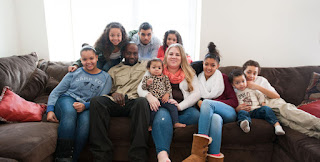Counting Blessings Improves Emotional Wellbeing
One of the tips for healthy living
is to count our blessings and be thankful. Many of us, moi inclusive,
will always moan about one disappointment or the other, forgetting every
disappointment is a blessing in disguise, and failing to recall and appreciate
successes and blessings achieved each day. Now, when you fail to pat yourself
on the back for achievements, how can saying ‘thank you’ to others become easy
for you? Compiling a gratitude list, as
a way of saying ‘thank you’ to someone, provides long-lasting mood boosts to
the writer. Speaking from the heart makes us happier, lifts the heavy burden off
our shoulders. According to psychologists, gratitude is a feeling we should develop because feeling thankful makes us happier and emphatic.
Make a Gratitude
List
If you’re not in the habit of appreciating a good deed,
no need to despair. There are some
simple exercises that can give even skeptics a short-term mood boost, and once
you get started, you find more and more things to be grateful for. Make a gratitude
list where you detail the kindnesses of someone you have never properly thanked.
Read this list aloud to the person you are thanking, and you will see
improvements in your mood. Studies show that for a full month after a person
has unburden the gratitude list to the recipient, happiness levels tend to go
up, while boredom and other negative feelings go down. In fact, the gratitude
visit is more effective than any other exercise in positive psychology.
Gratitude need not be directed at another person to experience
healthy emotional benefits. You can take just a few minutes each day to list
down things that make you thankful, from the kindness of associates to the food
on your table, or the fantastic successful presentation you just had at work.
After a few weeks, people who follow this routine feel better, more energetic
and vigilant. Findings from studies reveal that feeling thankful surprisingly brings
physical changes. Gratitude list keepers sleep better, do more exercise, and contented. All of these benefits may reduce stress and
contribute to overall health.
Do A Make Believe for Starters
If you feel slightly silly about reading a gratitude list
to anyone, you can practice saying ‘thank you’ severally during the day, and
very soon your mind comes to believe your words. Alternatively if there is no
one to thank, you can be grateful for just about anything that you have
received partly through someone or something else. You may feel grateful to
your neighbour for keeping an eye on your house while away for the weekend, to
your brother for always being there for you, or to God for sending your spouse
your way. Thankfulness helps you see that you’re a person to be loved and cared
for. Your confidence goes up a notch when you know people have done things for
you.
Focusing on gratitude may also remind you of little
bonuses that get lost in the ups and downs of a busy life. The most important
blessings are the ones that are most regular, such as family, health, and life. Unfortunately those are the ones we take for
granted. Gratitude helps you to identify and enjoy the beauty of life even if
the beauty does not come with a loud bang.
Besides, gratitude turns your attention to what you have instead of what
you don’t. Many times ungrateful people tend to think that material things,
such as a brand new Mercedes, or a giant flat-screen TV, or millions in the
bank will make them happy. Most times this is not the case. On the other hand, people who appreciate
their blessings are those who believe their happiness lies in fulfilling relationships
– not material things – which research has shown is the real sources of
satisfaction. Another plus is since grateful people are not preoccupied with material
things; they may cut back on negative energy involved in being envious and
making irritating comparisons with their friends or neighbours.
Gratitude Enhances Emotional Healing
Traumatic memories and negative events fade into the
background for people who regularly feel grateful, which suggests that
gratitude may enhance emotional healing. When individuals start a daily
gratitude list, they begin to feel a greater sense of belonging to the world.
The differences are noticed by others, as people who know them say they are
more helpful, says an expert psychologist. Further, being grateful may actually
start a happy cycle in which rich friendships bring joy, giving you more to be
grateful for, and in return strengthens your friendships once again.
Have you noticed how people light up when you say ‘thank
you’? Even a grumpy, tired, salesgirl cheers up slightly when you throw up a
‘thank you’. This is because a simple ‘thank you’ spurs people to act in
compassionate ways they might not otherwise consider. People thanked for their kindness
assist more willingly in the future, teachers who get thank-you letters are
encouraged to put in more efforts into teaching, and of course when you say
‘thank you’ to God for daily mercies, you get bigger favours, right?
In this fast paced age, gratitude may be seen as old
fashioned, but it does have its important role in society. It has its rewards
if we could imbibe the culture of saying ‘thank you’ more. It doesn't make you look silly, It is simple courtesy and appreciation of one
another.







Comments
Post a Comment